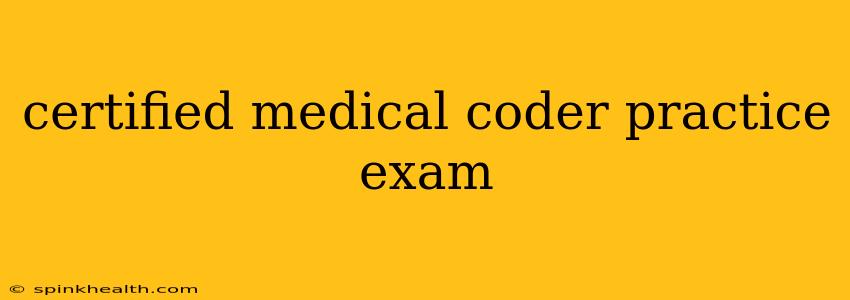Ace That Exam: Your Guide to Crushing the Certified Medical Coder Practice Exam
The day has arrived. You've poured over textbooks, memorized codes, and practiced countless scenarios. Now, the certified medical coder practice exam looms. Feeling the pressure? Don't worry, you've got this! This isn't just about passing a test; it's about proving your mastery of a crucial skillset in healthcare. Let's dive in and explore how to conquer this exam and launch your career.
This journey begins with understanding the exam itself. We'll unpack common questions, dispel anxieties, and equip you with strategies for success.
What to Expect on the Certified Medical Coder Practice Exam?
The certified medical coder practice exam is designed to rigorously test your knowledge and skills. Expect a mix of question types, including multiple-choice, true/false, and potentially fill-in-the-blank. The questions will cover a wide range of topics, assessing your understanding of medical terminology, anatomy, physiology, and, most importantly, the intricacies of medical coding systems like ICD-10-CM and CPT. Think of it as a comprehensive check-up for your coding abilities!
What are the common types of questions asked in a medical coding exam?
This is a crucial area. Many exam questions will test your ability to:
- Identify the correct ICD-10-CM code(s) for a given diagnosis: This will require a deep understanding of medical terminology and the nuances within the ICD-10-CM classification system. Expect scenarios involving complex diagnoses and comorbidities.
- Select the appropriate CPT code(s) for a given procedure: Similar to ICD-10-CM, you’ll need to analyze procedure descriptions carefully, considering modifiers and identifying the precise code that matches the performed service.
- Apply modifiers correctly: Modifiers are crucial for accurate coding. Questions will test your understanding of various modifiers and how they affect reimbursement.
- Interpret medical records accurately: This is foundational. You'll need to effectively extract relevant information from patient charts to determine appropriate codes.
- Understand coding guidelines and regulations: Staying up-to-date on compliance is paramount. The exam will assess your knowledge of official guidelines and regulations.
How can I prepare for the different types of coding questions?
Preparation is key! Here's a breakdown of effective strategies:
- Practice, Practice, Practice: Utilize numerous practice exams. This allows you to identify your weaknesses and focus on areas needing improvement.
- Understand the Guidelines: Don't just memorize codes; understand the logic behind them. The official coding manuals (ICD-10-CM and CPT) are your bibles.
- Master Medical Terminology: A strong foundation in medical terminology is crucial for accurate interpretation of medical records.
- Use Coding Software: Familiarize yourself with common Electronic Health Record (EHR) systems and coding software. Many practice exams incorporate these systems.
- Focus on the Details: Coding is precise. Pay close attention to details in medical records and code descriptions. A single word can make a difference.
What resources are available to help me prepare for a medical coding exam?
Plenty of resources are at your disposal! Textbooks, online courses, and practice exam software can all enhance your learning experience. Connect with other aspiring coders—peer learning is invaluable.
What if I fail the practice exam?
Don’t get discouraged! A practice exam is precisely that—practice. Analyze your mistakes, revisit challenging areas, and redouble your efforts. Use this as an opportunity for growth and refinement of your skills. Remember, the goal is mastery, not just a passing grade.
What are some common mistakes to avoid during the medical coding exam?
- Rushing: Take your time; accuracy is vital.
- Misinterpreting Medical Records: Thoroughly review all the information provided.
- Ignoring Modifiers: Modifiers significantly impact coding accuracy.
- Failing to Verify Codes: Double-check your selected codes against the official coding manuals.
Your journey to becoming a certified medical coder is an exciting one. This practice exam is a stepping stone, a chance to hone your skills and build confidence. Remember to approach it with focused preparation, a calm demeanor, and a deep understanding of the subject matter. You've come this far—now go ace that exam!

